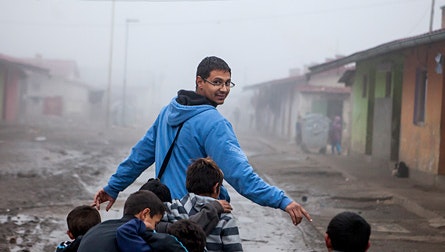
Who are the Roma?
The Roma are an ethnic group who have lived in Europe since their migration from India over 1,000 years ago. Roma cultural heritage includes a rich oral tradition, art forms such as flamenco, an emphasis on family, and Romanës, the Roma language. Roma identity is often portrayed stereotypically as that of the exotic or outsider “gypsy” (a label considered by many to be derogatory), but the reality is much more complex and varied.
How large is the Roma population in Europe, and what challenges do Roma face?
Today Roma are the largest—around 12 million people—and most disadvantaged ethnic minority in Europe. In 2003, a United Nations report provided, for the first time, robust statistical evidence on the extent of the challenges faced by Roma, including illiteracy, infant mortality, unemployment and segregation in education. Hunger and malnutrition, squalid housing without plumbing or sanitation, substandard health care, and other factors mean Roma have the shortest life expectancy in Europe.
How have Roma been excluded from society?
Over the centuries, Roma have been subjected to oppression and violence by other Europeans. During the Second World War, the Nazis exterminated hundreds of thousands of Roma (a time referred to as the Baro Porrajmos, or Great Devouring). After the war Roma continued to experience—and in some places, still do—killings, violence, forced sterilization, forced segregation, evictions, and extreme poverty.
Recently political leaders in Europe have fomented hatred of the Roma in order to win popular support. Their messages of intolerance resonate widely and often encourage violence from individuals and groups in countries such as Hungary, the Czech Republic and Romania where there have been fatal beatings, shootings, and firebombings against Roma.
Roma people are determined to resist the injustice. Decades ago, Roma began organizing internationally. In recent years, Roma activists and leaders have begun to grow in numbers, helped by a generation of university educated Roma graduates. These activists are working to organize their communities, build grassroots change and demand political action for justice.
How are the Open Society Foundations partnering with Roma to support change?
The Open Society Foundations have spearheaded an unprecedented effort, working with Roma communities to secure Roma’s rightful position in European society. This work includes:
- the European Roma Rights Centre, an international public interest organization that assists the Roma with strategic litigation, international advocacy, policy development, and training of Roma activists
- the Decade of Roma Inclusion 2005–2015, an international initiative in partnership with the World Bank, that committed signatory states to combat discrimination against the Roma and to close the gap in welfare and living conditions between the Roma and the overall population
- the Roma Education Fund, which has helped bring more than 156,000 Roma to school as students and as teachers
- through litigation, a landmark decision by the European Court of Human Rights to end school segregation of Roma children in the Czech Republic, a practice which places Roma children in special schools for children with learning disabilities
- breaking down barriers that keep the Roma from accessing quality health care services by fostering sound public health policies across Central and Eastern Europe
- Roma-led census registration campaigns helping decrease the invisibility and fear of Roma populations in parts of Central and Eastern Europe
- Barvalipe, the first-ever Roma Pride Summer Camp, bringing young Roma together to learn about Roma culture, history, and achievements
- hundreds of Roma organizations and individuals able to make their own voice heard in the search for equality and justice
Read more
Voices In Depth
Inside the Archives: George Soros and the Fight for Roma Dignity

For over 40 years, George Soros has been the leading private supporter of Europe’s Roma—the continent’s largest and most excluded ethnic minority—championing Roma leaders in their fight for equality and against deep-rooted discrimination.
Roma Rights
A New Roma-led Vision of Power

The new, independent, Roma Foundation for Europe is backed by a €100 million pledge that builds on Open Society’s over 30 years of support for Roma causes.
Roma Rights
Q&A: A Step Toward Justice for Roma Women

In November, the Slovak Republic formally apologized to Roma women for a program of forced sterilizations that stretched out for decades. How a Slovak human rights group helped hold the government accountable.